雅思 语法
雅思写作语法大全
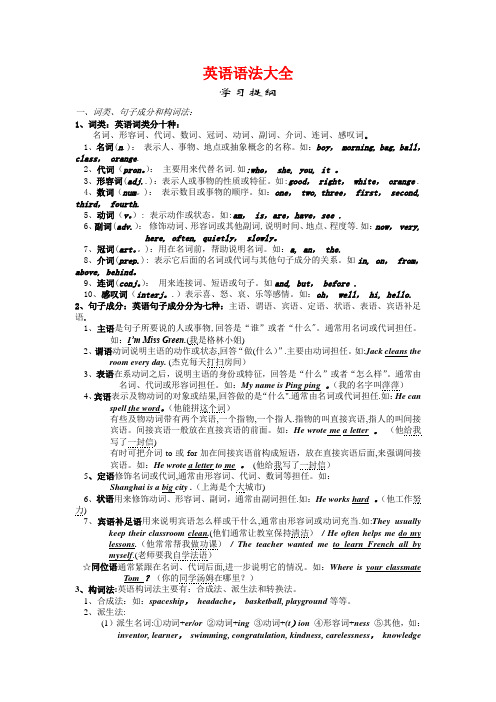
英语语法大全学习提纲一、词类、句子成分和构词法:1、词类:英语词类分十种:名词、形容词、代词、数词、冠词、动词、副词、介词、连词、感叹词。
1、名词(n.):表示人、事物、地点或抽象概念的名称。
如:boy, morning, bag, ball,class, orange.2、代词(pron。
):主要用来代替名词.如:who, she, you, it 。
3、形容词(adj..):表示人或事物的性质或特征。
如:good, right, white, orange .4、数词(num。
):表示数目或事物的顺序。
如:one, two, three, first, second, third, fourth.5、动词(v。
): 表示动作或状态。
如:am, is,are,have,see .6、副词(adv.):修饰动词、形容词或其他副词,说明时间、地点、程度等.如:now, very,here, often, quietly, slowly。
7、冠词(art。
):用在名词前,帮助说明名词。
如:a, an, the.8、介词(prep.): 表示它后面的名词或代词与其他句子成分的关系。
如in, on, from,above, behind。
9、连词(conj。
):用来连接词、短语或句子。
如and, but, before .10、感叹词(interj。
.)表示喜、怒、哀、乐等感情。
如:oh, well, hi, hello. 2、句子成分:英语句子成分分为七种:主语、谓语、宾语、定语、状语、表语、宾语补足语.1、主语是句子所要说的人或事物,回答是“谁”或者“什么"。
通常用名词或代词担任。
如:I’m Miss Green.(我是格林小姐)2、谓语动词说明主语的动作或状态,回答“做(什么)”.主要由动词担任。
如:Jack cleans theroom every day. (杰克每天打扫房间)3、表语在系动词之后,说明主语的身份或特征,回答是“什么”或者“怎么样”。
雅思常用语法总结

雅思常用语法总结雅思考试中常用的语法总结如下:1. 时态:包括一般现在时、一般过去时、现在进行时、过去进行时、将来时、过去将来时等。
时态的正确使用是非常重要的,特别是在写作和口语表达中。
2. 被动语态:被动语态用于强调动作的接受者和动作的重要性。
被动语态的形式为“助动词be + 过去分词”,常用的助动词有am, is, are, was, were等。
3. 条件句:条件句用于表达假设、可能性、推测等。
包括三种类型:零条件句(零条件句表示一般事实)、一般条件句(表示现在或将来的情况)、虚拟条件句(表示与现实相反的假设或不可能实现的情况)。
4. 从句:从句是一个句子中的一部分,具有主语和谓语,可做其他句子的主语、宾语、状语等。
常见的从句包括名词性从句(作主语、宾语、表语等)、定语从句(修饰名词)、副词从句(修饰动词、形容词、副词等)。
5. 并列结构:并列结构用于连接两个或多个相同重要性的句子,可以使用连词and, but, or等。
并列结构使句子更加流畅和有逻辑性。
6. 符合最佳用法:在雅思写作中,使用符合最佳用法是非常重要的。
这包括使用适当的连接词、平衡句子结构和长度、使用多样的句型和长句,并在表达观点时提供足够的支持和证据。
7. 倒装句:倒装句的语序颠倒是为了强调特定的信息或实现平衡和连贯。
常见的倒装情况包括完全倒装(谓语动词位于主语之前)、部分倒装(助动词位于主语之前)和否定倒装(否定词位于句首)。
8. 间接引语:间接引语用于转述别人的话或思想。
常见的引述动词包括say, tell, ask等。
在使用间接引语时,需要注意时态的转换和引号的使用。
这些是雅思考试中常用的语法要点总结,合理运用这些语法规则可以提高语言表达的准确性和流利度。
同时,还需要多加练习,掌握常用的语法用法。
雅思英语语法
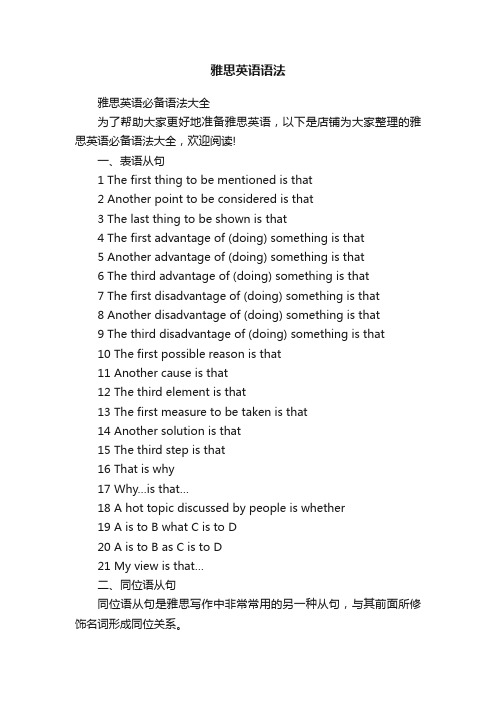
雅思英语语法雅思英语必备语法大全为了帮助大家更好地准备雅思英语,以下是店铺为大家整理的雅思英语必备语法大全,欢迎阅读!一、表语从句1 The first thing to be mentioned is that2 Another point to be considered is that3 The last thing to be shown is that4 The first advantage of (doing) something is that5 Another advantage of (doing) something is that6 The third advantage of (doing) something is that7 The first disadvantage of (doing) something is that8 Another disadvantage of (doing) something is that9 The third disadvantage of (doing) something is that10 The first possible reason is that11 Another cause is that12 The third element is that13 The first measure to be taken is that14 Another solution is that15 The third step is that16 That is why17 Why…is that…18 A hot topic discussed by people is whether19 A is to B what C is to D20 A is to B as C is to D21 My view is that…二、同位语从句同位语从句是雅思写作中非常常用的另一种从句,与其前面所修饰名词形成同位关系。
雅思口语语法知识点总结

雅思口语语法知识点总结一、一般现在时:一般现在时表示经常性或习惯性的动作,或陈述现在的事实、真理、心得体会等。
1. 关于第三人称单数形式,一般动词加s。
例如:She goes to school every day.2. 并不是所有单词在加s或es,不规则变化。
例子:I go to school every day.二、一般过去时:一般过去时表示过去某个时间发生的动作或已经完成的动作。
1. 一般动词变化为过去式。
例如:I went to school yesterday.2. 动词to be的过去式。
例如:He was at home yesterday.三、现在进行时:现在进行时表示现在进行的动作。
1. 动词to be的现在进行时。
例如:He is playing basketball now.2. 现在分词短语。
例如:She is studying in her room.四、过去进行时:过去进行时表示在过去某个时间正在进行的动作。
1. 动词to be的过去进行时。
例如:She was cooking dinner when I arrived home.2. 过去分词短语。
例如:We were watching TV at 8 o'clock last night.五、一般将来时:一般将来时表示将来某个时间要发生的动作或已经预定好的事情。
1. 动词will。
例如:I will visit my family next week.2. 动词going to。
例如:She is going to start a new job next month.3. 现在进行时。
例如:We are leaving for the airport at 3 o'clock.六、现在完成时:现在完成时表示过去某个时间开始,一直持续到现在的动作或者发生的动作与现在相关。
1. 动词have/has。
雅思语法 ppt课件
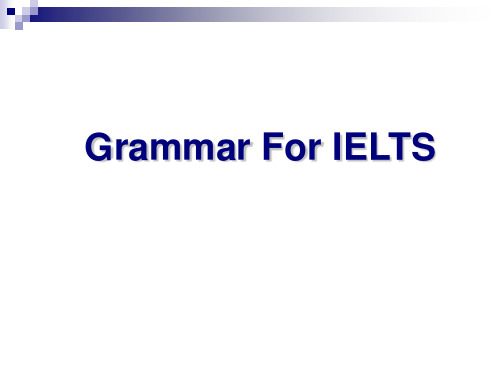
语法的主流趋势
我要喝点东西。 I want a drink.
a water, a beer, a coffee 创新是必须的。 Innovation is a must.
语法在“进化”
1. 句子成分: 主谓宾+定状补 2. 简单句:五大基本句型 3. 并列句 4. 复合句: 宾语从句,定语从句,状语从句 5. 动词四类和五大基本时态
165
IELTS 7 99
112
94
101
TOTAL
雅思写作
雅思写作 并列句
2009 15
定语从句 状语从句 名词性从 句(主宾 表同)
8
7
36
2008 17
9
10
39
Grammar & vocabulary
Grammar 无规矩不成方圆
Vocabulary 巧妇难为无米之炊
Reading > > >Writing Listening > > >Speaking
及物动词,直接跟宾语,如 eat, drink, know, play, watch
不及物动词,可以不直接跟宾语, 如 jump, sit, stand, think, sleep, wait, die, fight, run, live
情态动词或其他助动词加动词原形 系动词 如 am, is , are
9. I‘m not sure____if_/w_h_e_t_h_er_i_t _w_il_l b_e__su_n_n_y_t_o_m_o_r_ro_w_______(明天天 气是否晴朗)
10.He asked me_____w_h_a_t_I_d_id__w_it_h_th_e__m_a_tt_e_r ___________(是如何 处理这件事的)
雅思语法知识点总结
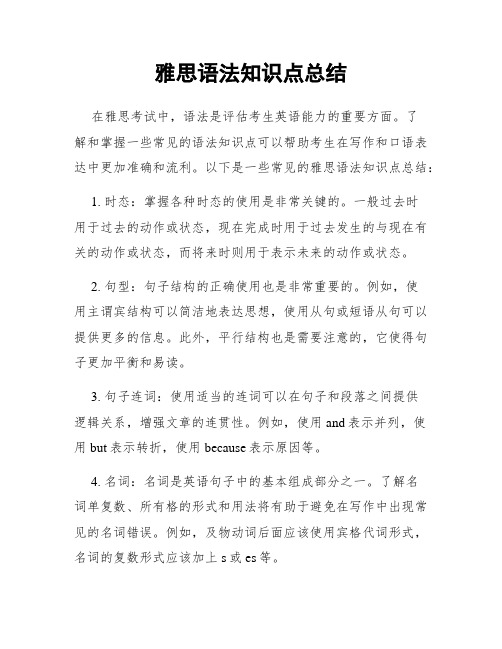
雅思语法知识点总结在雅思考试中,语法是评估考生英语能力的重要方面。
了解和掌握一些常见的语法知识点可以帮助考生在写作和口语表达中更加准确和流利。
以下是一些常见的雅思语法知识点总结:1. 时态:掌握各种时态的使用是非常关键的。
一般过去时用于过去的动作或状态,现在完成时用于过去发生的与现在有关的动作或状态,而将来时则用于表示未来的动作或状态。
2. 句型:句子结构的正确使用也是非常重要的。
例如,使用主谓宾结构可以简洁地表达思想,使用从句或短语从句可以提供更多的信息。
此外,平行结构也是需要注意的,它使得句子更加平衡和易读。
3. 句子连词:使用适当的连词可以在句子和段落之间提供逻辑关系,增强文章的连贯性。
例如,使用and表示并列,使用but表示转折,使用because表示原因等。
4. 名词:名词是英语句子中的基本组成部分之一。
了解名词单复数、所有格的形式和用法将有助于避免在写作中出现常见的名词错误。
例如,及物动词后面应该使用宾格代词形式,名词的复数形式应该加上s或es等。
5. 代词:代词用于替代名词,可以使句子更加紧凑和准确。
但是,在使用代词时需要注意其指代的清晰性,避免产生歧义。
此外,还要注意代词的人称和数的一致性。
6. 介词:介词是表达时间、地点、方式等意义的重要词类。
正确使用介词可以使句子更加清晰和准确。
一些常见的介词包括in、on、at、for、with等。
7. 形容词和副词:形容词用于描述名词,副词用于修饰动词、形容词或其他副词。
掌握形容词和副词的比较级和最高级形式以及其正确的位置和用法将有助于提升句子的表达能力。
8. 否定和疑问句:了解和使用否定句和疑问句的正确形式对于雅思考试至关重要。
对于否定句,常使用not来否定谓语动词;对于疑问句,一般将助动词或情态动词提到句首。
以上是一些常见的雅思语法知识点总结。
通过熟练掌握这些知识点,并在练习和实践中加以应用,考生可以提高自己的语法水平,更好地应对雅思考试。
雅思写作之常用的语法句型
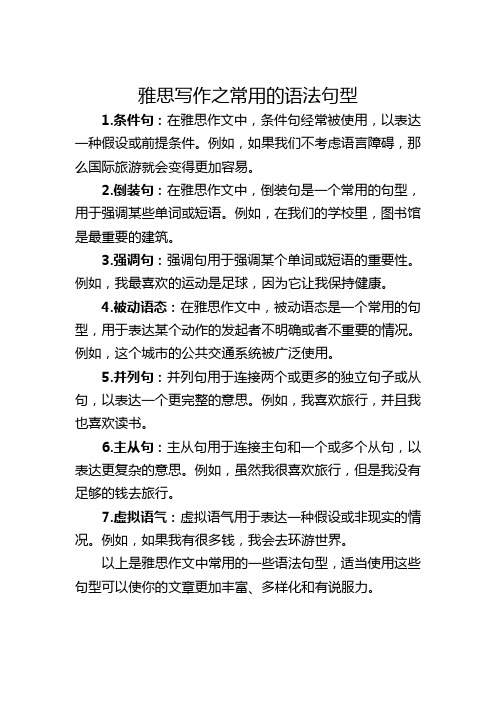
雅思写作之常用的语法句型
1.条件句:在雅思作文中,条件句经常被使用,以表达一种假设或前提条件。
例如,如果我们不考虑语言障碍,那么国际旅游就会变得更加容易。
2.倒装句:在雅思作文中,倒装句是一个常用的句型,用于强调某些单词或短语。
例如,在我们的学校里,图书馆是最重要的建筑。
3.强调句:强调句用于强调某个单词或短语的重要性。
例如,我最喜欢的运动是足球,因为它让我保持健康。
4.被动语态:在雅思作文中,被动语态是一个常用的句型,用于表达某个动作的发起者不明确或者不重要的情况。
例如,这个城市的公共交通系统被广泛使用。
5.并列句:并列句用于连接两个或更多的独立句子或从句,以表达一个更完整的意思。
例如,我喜欢旅行,并且我也喜欢读书。
6.主从句:主从句用于连接主句和一个或多个从句,以表达更复杂的意思。
例如,虽然我很喜欢旅行,但是我没有足够的钱去旅行。
7.虚拟语气:虚拟语气用于表达一种假设或非现实的情况。
例如,如果我有很多钱,我会去环游世界。
以上是雅思作文中常用的一些语法句型,适当使用这些句型可以使你的文章更加丰富、多样化和有说服力。
最新雅思英语语法专题复习(附练习答案)
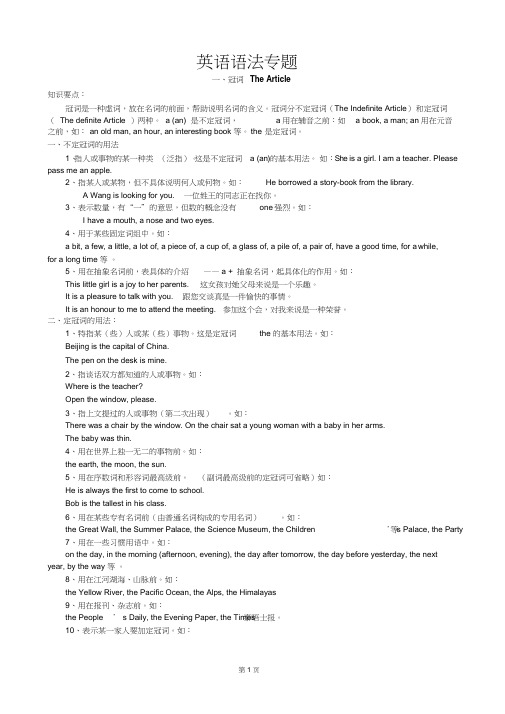
知识要点:英语语法专题一、冠词The Article冠词是一种虚词,放在名词的前面,帮助说明名词的含义。
冠词分不定冠词(The Indefinite Article)和定冠词(The definite Article )两种。
a (an) 是不定冠词, a 用在辅音之前:如 a book, a man; an 用在元音之前,如:an old man, an hour, an interesting book 等。
the 是定冠词。
一、不定冠词的用法1、指人或事物的某一种类(泛指)。
这是不定冠词 a (an)的基本用法。
如:She is a girl. I am a teacher. Please pass me an apple.2、指某人或某物,但不具体说明何人或何物。
如:He borrowed a story-book from the library.A Wang is looking for you. 一位姓王的同志正在找你。
3、表示数量,有“一”的意思,但数的概念没有one 强烈。
如:I have a mouth, a nose and two eyes.4、用于某些固定词组中。
如:a bit, a few, a little, a lot of, a piece of, a cup of, a glass of, a pile of, a pair of, have a good time, for a while,for a long time 等。
5、用在抽象名词前,表具体的介绍——a + 抽象名词,起具体化的作用。
如:This little girl is a joy to her parents. 这女孩对她父母来说是一个乐趣。
It is a pleasure to talk with you. 跟您交谈真是一件愉快的事情。
It is an honour to me to attend the meeting. 参加这个会,对我来说是一种荣誉。
雅思阅读语法名词性从句

一
主语从句
No 东升求实学校教育通讯工作总结报告
Image Dongsheng Qiushi XueXiao Jiaoyu TongXun Gongzuo ZongJie
在复合句中充当主语的从句
1 that引导主语从句
that引导主语从句时不同于其他的连词;既无词义也不作成分;
只起单纯的连接作用;且通常不可以省; 为了强调that引导的主
The odds are that he will not do it
2表示某人的意见 信念等的实际内容; Our belief is that things will improve The trouble is that we are short of money
2 whether引导表语从句不可用if; His first question was whether Holmes had arrived yet The question is whether people will buy it
No 东升求实学校教育通讯工作总结报告
2 whether引导主语从句;意为是否;只起连接作用;不充当任何成分; 置于 Image Dongsheng Qiushi XueXiao Jiaoyu TongXun Gongzuo ZongJie 句首时必须用whether引导;置于句尾时;间或可用if; Whether he will win the game is not clear Whether he will come is uncertain Whether she comes or not doesn't concern me It is not clear whether/if he will come It was uncertain whether he would come
雅思英语语法讲义
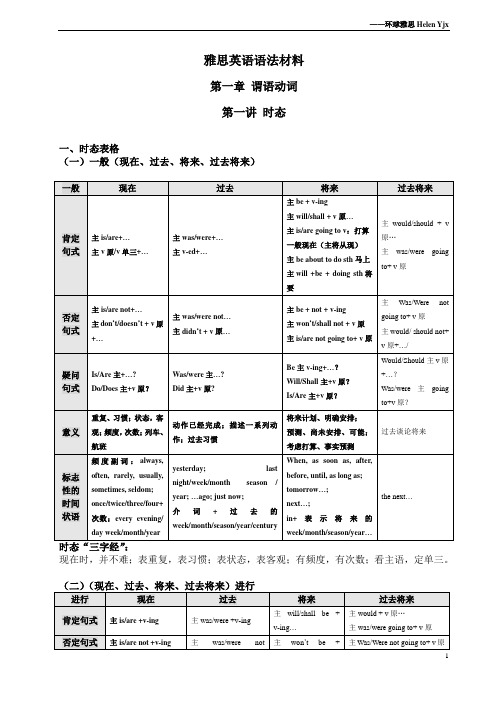
雅思英语语法材料第一章谓语动词第一讲时态一、时态表格(一)一般(现在、过去、将来、过去将来)现在时,并不难;表重复,表习惯;表状态,表客观;有频度,有次数;看主语,定单三。
(三)(现在、过去、将来、过去将来)完成(四)(现在、过去、将来、过去将来)完成进行二、基本时态演练Listening to the following conversation.(一) Task One: fill in the blanks.1. Interviewer: Your name?Peter: Peter __________. (1)2. Interviewer: ________ (2) you work or _________ (3) you a student?Peter: I’m studying really hard for my exams this month—I’m doing math’s at university—but I also________ (4) my parents out. They own a _________ (5) and I ________ (6) there as a waiter in the evenings, so I ____________ (7) a lot of free time during the week.My mom is always saying that I _____________ (8) enough in the restaurant! But I do manage to find some free time most days.3. Interviewer: Can you look at the _____ (9) and tell me whether you do any of these things and if so, how ____ (10)?Peter: I love music and I’m learning to play the piano. I ______ (11) really early and practice for an hour or so just about every day. I also play the guitar in a band with some other friends. We used to practice together at least _____________ (12) a week but these days we only manager to meet about once __________________ (13).4. Interviewer: What about the next thing on the list? -_________________ (14)?Peter: Well, I used to play them all the time but now I’m too busy studying and I _______ (15) miss them at all.5. Interviewer: Do you use a computer for other things?Peter: I use the Internet just about ________ (16) for my studies. And I also use it to _____________ (17) my friends and my family. My cousin is living in Thailand at the moment and he _______ (18) me regular emails to let me know how much fun he’s having! He’s always visiting exciting places.6. Interviewer: Now, how about _________________ (19)?Peter: Actually, I joined the local football team when I was at school and I still play _______________ (20) provided I can get to training. I much prefer playing football to watch it on TV, though I do ______________ (21) watch a match if there’s a big final or something.7. Interviewer: What about going to watch live matches?Peter: I’d love to be able to afford to go every week because I ____________ (22) my local team, but students don’t ____________ (23) have much money, you know! I can remember the ___________ (24) I went to a live match. Oh, sorry, I can see my friends—I ____________ (25)go now!(二)Task TwoRead through the conversation and find out:1. Present simple sentences:2. Present continuous:3. Past simple sentences:三、时态改错1. People should act according to what they are believing.2. In general, I think our government spent too much money on space travel.3. Nowadays, many people in my country have sent their children to single-sex schools.4. These days, more and more people traveling to very distant places for their holidays.5. I am hoping it is not too late to save the environment.6. The female hen laying on average 5 or 6 eggs per week.7. Younger drivers is more likely to be involved in a car accident.8. Most doctors are agreeing that the only way to lose weight is by doing more exercise.第二讲语态一、被动语态的形式二、被动语态使用情景(一)一般说来,当强调动作承受者,不必说出执行者或含糊不清的执行者时,多用被动式1. I agree with the statement that there should be no government restriction on creative artists who express themselves in the way they do and that they must be given freedom for the same. (IELTS 4, Band 7, p167)2. There is almost everything good in what is given to us through the media world which is made up of artists. (同上)3. In conclusion, I strongly agree with that children should be taught to cooperate rather than compete. (IELTS 5, Band 6, p167)4. It was opened in the year 1863, and it is already 140 years old. (IELTS 5, Band 7, p168)(二)在描述事件和客观事实的时候,被动语态用得更多1. The use of electricity in England is indispensed with. (IELTS 4, Band 6, p164)2. Demand for electricity in England during typical days in winter and summer is illustrated in the graph. (同上)3. The use of average English home is shown in the pie chart. (同上)(三)主语是泛指很多人或者大部分人这个方面1. A more dramatic rise is predicted between 2030 and 2040 in Japan, by which it is thought thatthe proportion of elderly people will be similar in the three countries. (IELTS 5, model answer, p162)2. It can be argued that…It is advised/believed/universally accepted/generally recognized that…It is said/reported/estimated that…(四)当上下文已经说明了动作执行者时:A law was introduced to help protect people in this situation.(五)动作的执行者并不重要时:In the factory, the shoes are cleaned and packed into boxes ready for sale.(六)需要体现动作的执行者时,加by-短语:A lot of waste materials could be recycled by large manufacturers.三、剑指考试1. To enrich vocabulary, we should read more authentic materials.可以改为:(1)(2)(3)2. It is important for nations all over the world to work hard together to control the environmental pollution.可以改为:3. I am not sure whether all the college graduates can find jobs after graduation.可以改为:4. 用适当的动词形式完成下列句子:(1)My home _____________ (locate) in the western part of the city.(2)These funds can _____________ (give) to the poorer people to help them.(3)We _____________ (not tell) that the rules had changed.(4)Children need to _____________ (teach) the correct way to behave in public.5. 句子改错:(1)The house was sell for over a million dollars.(2)The class has allowed to eat in the staff dining room during the renovations.(3)The potatoes carry along a conveyor belt to a room where they wash and peel. (4)The teacher told to take her class out of the school if the fire bell rang.(5)Smoking don’t allow in any part of the aeroplane.(6)The museum was being renovating when we were there, so we could not visit it. (7)Bus tickets can buy at any newsagents.(8)New employees have instructed not to operate the photocopier until they are trained.6. 把下面的句子改成被动语态,并决定是否需要带by-短语(1)A factory worker checks each box for quality.(2)The government does not permit children under 16 to work.(3)The washing machine is washing your clothes at the moment.(4)A mechanic will repair your car this afternoon.(5)The agent has sold our house at last.(6)Something tore the back of my coat.(7)The employer pay off the staff more for working at the weekend.(8)Burning tires give off highly toxic chemicals.第三讲虚拟语气请欣赏下列一首诗歌:If you were a teardrop in my eye,For fear of losing you, I would never cry.And if the golden sun should cease to shine its light,Just one smile from you would make my whole world bright.一、虚拟语气基本句型1. 与现在事实相反(1) If she were sick, she could stay at home and have a rest today.(2) If you watched more and talked less, we would both enjoy our film.2. 与过去事实相反(1) If they had studied earlier, they would have passed the IELTS.(2) Helen would have graduated with her class if she had been able to meet all the requirements in time.3. 与将来事实相反(1) If it snowed tomorrow, I would go skiing.(2) If it should snow tomorrow, I would go to make a snowman in front of our dormitory.(3) If you were to see your tutor, what would you tell him?4.错综的虚拟语气(1) If I were you, I wouldn’t have told that to her. (时间错综:从句现在,主句过去)(2) Had I taken my umbrella with me in the morning, I should not be wet now. (时间错综:从句过去,主句现在)5.虚拟语气的倒装可以把条件句中的if 省略掉,同时把should, were, had 等助动词提前,构成倒装句。
雅思语法
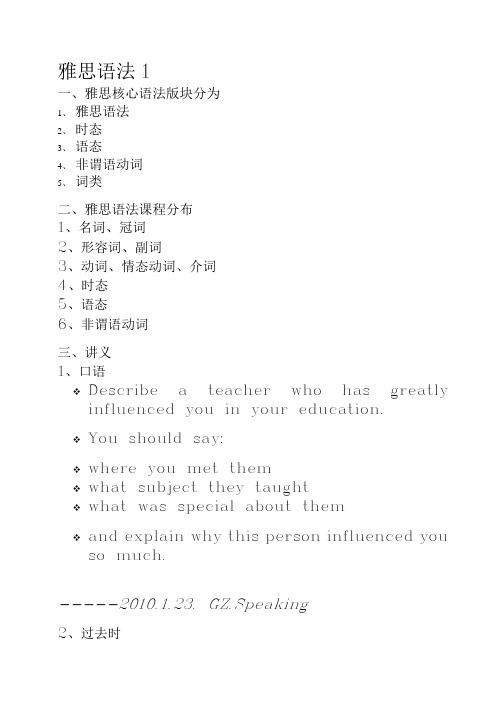
雅思语法1一、雅思核心语法版块分为1、雅思语法2、时态3、语态4、非谓语动词5、词类二、雅思语法课程分布1、名词、冠词2、形容词、副词3、动词、情态动词、介词4、时态5、语态6、非谓语动词三、讲义1、口语❖Describe a teacher who has greatly influenced you in your education.❖You should say:❖where you met them❖what subject they taught❖what was special about them❖and explain why this person influenced you so much.-----2010.1.23. GZ.Speaking2、过去时❖一般过去时❖过去进行时❖过去完成时❖过去完成进行时❖一般过去将来时❖过去将来进行时❖过去将来完成时❖过去将来完成进行时3、听力❖Engine Type: 1.4 liter(s)?-------Cambridge5/Test3/Listening4、名词:名词的数❖所有单位名词均为可数名词,均有单数,复数之分.❖1.4 liters=1.4-liter5、写作❖The development of technology changes the way people interact with each other.❖In which way does it change the types of relationship that people make?❖Does it have positive or negative effect on the development?---- 2009.8.8 Writing.Task2❖在互联网发明之前,家庭成员之间的关系亲密。
Family members had a close relationship with each other before the invention of Internet.----一般过去时❖新的媒体正在出现。
雅思重点词汇与语法
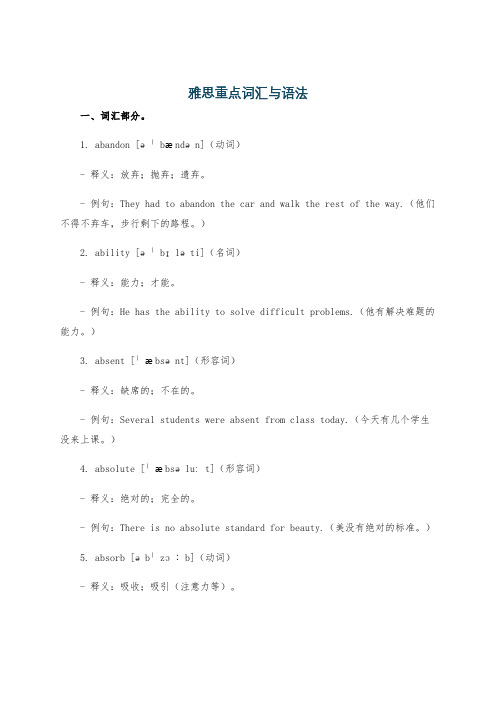
雅思重点词汇与语法一、词汇部分。
1. abandon [əˈbændən](动词)- 释义:放弃;抛弃;遗弃。
- 例句:They had to abandon the car and walk the rest of the way.(他们不得不弃车,步行剩下的路程。
)2. ability [əˈbɪləti](名词)- 释义:能力;才能。
- 例句:He has the ability to solve difficult problems.(他有解决难题的能力。
)3. absent [ˈæbsənt](形容词)- 释义:缺席的;不在的。
- 例句:Several students were absent from class today.(今天有几个学生没来上课。
)4. absolute [ˈæbsəluːt](形容词)- 释义:绝对的;完全的。
- 例句:There is no absolute standard for beauty.(美没有绝对的标准。
)5. absorb [əbˈzɔːb](动词)- 释义:吸收;吸引(注意力等)。
- 例句:Plants absorb carbon dioxide from the air.(植物从空气中吸收二氧化碳。
)6. abstract [ˈæbstrækt](形容词/名词)- 作为形容词:抽象的。
- 例句:This is an abstract concept that is difficult to understand.(这是一个难以理解的抽象概念。
)- 作为名词:摘要;抽象派艺术作品。
- 例句:Please write an abstract of your paper.(请写一篇你的论文摘要。
)7. abundant [əˈbʌndənt](形容词)- 释义:丰富的;充裕的。
- 例句:There is an abundant supply of fresh water in this area.(这个地区有充足的淡水供应。
雅思地道语法知识点总结
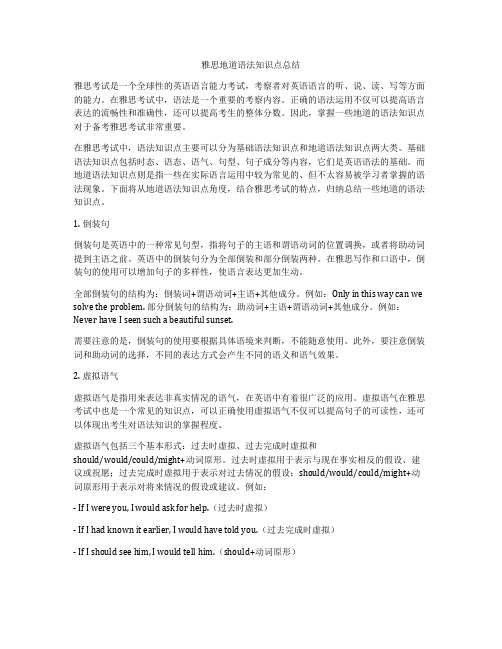
雅思地道语法知识点总结雅思考试是一个全球性的英语语言能力考试,考察者对英语语言的听、说、读、写等方面的能力。
在雅思考试中,语法是一个重要的考察内容。
正确的语法运用不仅可以提高语言表达的流畅性和准确性,还可以提高考生的整体分数。
因此,掌握一些地道的语法知识点对于备考雅思考试非常重要。
在雅思考试中,语法知识点主要可以分为基础语法知识点和地道语法知识点两大类。
基础语法知识点包括时态、语态、语气、句型、句子成分等内容,它们是英语语法的基础。
而地道语法知识点则是指一些在实际语言运用中较为常见的、但不太容易被学习者掌握的语法现象。
下面将从地道语法知识点角度,结合雅思考试的特点,归纳总结一些地道的语法知识点。
1. 倒装句倒装句是英语中的一种常见句型,指将句子的主语和谓语动词的位置调换,或者将助动词提到主语之前。
英语中的倒装句分为全部倒装和部分倒装两种。
在雅思写作和口语中,倒装句的使用可以增加句子的多样性,使语言表达更加生动。
全部倒装句的结构为:倒装词+谓语动词+主语+其他成分。
例如:Only in this way can we solve the problem. 部分倒装句的结构为:助动词+主语+谓语动词+其他成分。
例如:Never have I seen such a beautiful sunset.需要注意的是,倒装句的使用要根据具体语境来判断,不能随意使用。
此外,要注意倒装词和助动词的选择,不同的表达方式会产生不同的语义和语气效果。
2. 虚拟语气虚拟语气是指用来表达非真实情况的语气,在英语中有着很广泛的应用。
虚拟语气在雅思考试中也是一个常见的知识点,可以正确使用虚拟语气不仅可以提高句子的可读性,还可以体现出考生对语法知识的掌握程度。
虚拟语气包括三个基本形式:过去时虚拟、过去完成时虚拟和should/would/could/might+动词原形。
过去时虚拟用于表示与现在事实相反的假设、建议或祝愿;过去完成时虚拟用于表示对过去情况的假设;should/would/could/might+动词原形用于表示对将来情况的假设或建议。
田静 雅思语法

田静雅思语法
田静的雅思语法主要包括以下几个方面:
1. 时态使用:
- 现在时:用于表达普遍真理、习惯或经常发生的动作。
- 过去时:用于表达过去发生的动作或状态。
- 将来时:用于表达将来要发生的动作或计划。
2. 被动语态:
- 主动变被动:将动作的执行者变成动作的承受者。
- 被动变主动:将动作的承受者变成动作的执行者。
3. 语态的转换:
- 主动转被动:将主语和宾语的位置调换,并加上适当的助
动词和分词形式。
- 被动转主动:根据句子的语境,确定主语和宾语的身份,
并进行相应的改写。
4. 句子结构:
- 简单句:由一个主语和一个谓语构成。
- 并列句:由两个或多个简单句通过连词连接而成。
- 复合句:由一个主句和一个或多个从句构成。
5. 连词的使用:
- 并列连词:用于连接并列的词、短语或句子,如and、but、or等。
- 从属连词:用于引导从句,如if、when、because等。
以上是田静的一些雅思语法知识,不足之处还请指正。
雅思考试之必备语法知识

雅思考试之必备语法知识雅思考试主要考察的是考生的语言应用能力,所以语法不是唯一的标准。
但是,学会一些基础的语法知识可以帮助考生更好地理解和使用英语,从而在考试中更准确地表达自己的意思。
以下是一些在雅思考试中可能会用到的语法知识。
1.主语和谓语在英语中,每个句子都有主语和谓语,主语通常是人或事物,而谓语则是描述主语的动作或状态。
例如,“I am studying”(我正在学习)中的主语是“I”,谓语是“am studying”。
2.动词时态和语态动词时态表示动作发生的时间,如现在、过去或未来;语态则表示动作的执行者是谁,例如主动或被动。
例如,“I am studying”(我正在学习)中的动词“am studying”是现在进行时态,表示动作正在进行。
3.名词和代词名词表示人、事物、地点等概念,而代词则代替名词或名词词组,以避免重复。
例如,“I like dogs”(我喜欢狗)中的“dogs”是名词,“I”是代词。
4.形容词和副词形容词和副词用来描述名词或代词的特征、状态或动作。
例如,“She is beautiful”(她很漂亮)中的“beautiful”是形容词,用来描述“她”的外貌特征。
5.介词短语和从句介词短语通常表示位置、时间、原因等关系,从句则是用完整的句子来做为另一个句子的成分。
例如,“I am studying in the library”(我在图书馆学习)中的“in the library”是介词短语,表示“我”所在的位置,“I am studying”是从句,作为整个句子的主语和谓语。
总的来说,学会这些基础的语法知识可以帮助考生更好地理解和使用英语,从而在考试中更准确地表达自己的意思。
但是,考试题目的难易程度和具体内容也会影响语法的出现频率和分布,所以考生还需要广泛阅读和积累词汇。
雅思写作常见语法(比较级和主谓一致)

as ugly as a ____ as strong as a ___
❖ Basketball is the most popular of sports in this country.
❖ Chinese is a most difficult language. ❖ 平行结构与比较级
❖ 平行结构很多情况下是由形容词或副词的比较 级或者暗含比较意味的连词引导的
❖ 大多数情况下平行结构都是具有一定的比较含义 的,有的是递进对比
调少) ❖ I have not more than 5 dollars in my pocket.(不
多于,稍少于)
❖ no less than not less than He is no less determined than you.(不亚于) He is not less determined than you.(不少于,稍 大于)
❖ 加倍数和数字时的句序错误
❖ “Do you regret paying five hundred dollars for the painting?” “No, I would gladly have paid for it.”
❖ [A] twice so much [B] twice as much [C] as much twice [D] so much twice
昂贵的
lonely 孤独的
❖ deadly 死一般的 lively 活泼的
- 1、下载文档前请自行甄别文档内容的完整性,平台不提供额外的编辑、内容补充、找答案等附加服务。
- 2、"仅部分预览"的文档,不可在线预览部分如存在完整性等问题,可反馈申请退款(可完整预览的文档不适用该条件!)。
- 3、如文档侵犯您的权益,请联系客服反馈,我们会尽快为您处理(人工客服工作时间:9:00-18:30)。
雅思语法
雅思考试的语法要求非常高,以下是雅思语法的一些重点:
1. 时态
雅思考试中要求考生能够正确使用各种时态。
有些场合需要使用
过去时态,有的需要使用现在时态,而有的则需要使用将来时态。
考
生需要在语法上灵活掌握各种时态,特别是在写作和口语部分要注意
时态的正确使用。
2. 主谓一致
主谓一致是英语语法中最基本和最重要的一部分。
它强调了主谓
关系必须是在人名、代词、数词等主语和动词、助动词等谓语之间达
成一致。
考生需要对主谓一致,特别是在使用不定代词、复合主语和
虚拟语气时,要更加注意。
3. 语态
语态是指句子所表达的动作或状态与说话者的关系。
英语语法中
有主动语态和被动语态两种,考生要能够掌握这两种语态的正确应用。
在雅思考试中,有时候考生需要写被动语态的句子,特别是在写作中,需要认真掌握被动语态的用法。
4. 复合句
复合句是由两个或两个以上分句组成的句子,其中至少有一个从句。
在雅思考试中,有很多题型需要考生使用复合句来回答问题或表
达自己的观点,如:听力、阅读、写作等。
考生需要掌握各种连接词
的用法,并在语法上灵活应用它们。
5. 倒装句
倒装句是英语语法中的一种句型,被广泛应用在雅思考试的各个
部分。
它的特点是主语和谓语动词在句子中位置颠倒。
考生需要能够
准确理解和使用倒装句,并了解不同情景下的倒装结构。
总之,雅思考试的语法要求非常高,考生需要通过大量的练习来
巩固和提高自己的语法水平。
只有在语法正确的基础上,才能获得更高的雅思分数。
